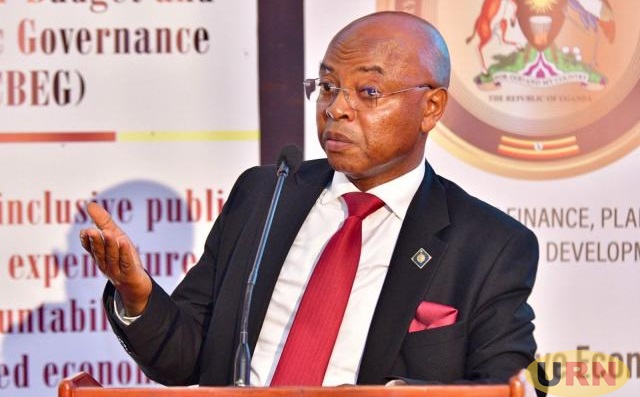
Kampala, Uganda | THE INDEPENDENT | Outspoken Bank of Uganda Deputy Governor, Professor Augustus Nuwagaba has lashed at Ugandan who continue to “cry” over President Donald Trump’s aid cuts to HIV/AIDS treatment and research in Uganda and other Africa countries.
Seemingly sounding rather rude, Nuwagaba was non apologetic saying Uganda did not take an agreement with Trump that he was going to treat Uganda’s sick people forever.
“Have you taken an agreement with President Trump that he must look for your sick people?” asked Nuwagaba, one of the speakers at the Musevenomics conference organized by Uganda Development Forum Think Tank.
“How can you think that someone can continue paying for your medicine for I don’t know how many years? How can you think that you are going to continue borrowing failing to do anything on your land?” he asked.
He said that there is no country which will make progress without pooling its own resources “In other words there is no living on savings of others. Let me address myself to ladies here. Never take a lift. You take a lift you will never now whet will happen to you,” he cautioned.
In an attempt to make his massage about the need for one to be self-reliant, Nuwagaba went native.
PEPFAR, the U.S. President’s Emergency Plan for AIDS Relief, has been a major partner in Uganda’s fight against HIV/AIDS, providing funding and support for various programs. PEPFAR Uganda’s focus includes HIV/AIDS prevention, care, and treatment, as well as addressing the broader health system to enhance the country’s ability to combat the epidemic.
Through PEPFAR, the U.S. Government had invested $70 billion dollars in bilateral HIV/AIDS programs, the Global Fund, and tuberculosis programs. PEPFAR had helped reduce AIDS-related deaths by 45 percent since their peak in 2004.
More than 1.5 million Ugandans are estimated to be living with HIV and AIDS. Since 2004, PEPFAR has collaborated with the Government of Uganda, national, international, and civil society organizations on building Uganda’s capacity to lead the HIV/AIDS response.
Researchers have suggested that without influxes of cash to replace USAID funding, 15 million people could die of HIV/AIDs related deaths by 2040. They predict that the majority of deaths could occur in Uganda, Nigeria and four other countries.
According to an article printed in Nature journal on 20th May 2025, cuts to international aid ordered by Donald Trump have caused many African HIV researchers to fear for the future of long-term research programmes.
In January, as one of his first acts after taking office, the US president froze all foreign aid and announced a 90-day review.
Also under threat are US National Institutes of Health (NIH) grants that support HIV research in Africa: cuts have affected funding for HIV-related research in specific populations, and a mechanism that awards grants to international collaborators has been suspended.
US dollars have been key in mitigating the scourge of the virus, both through research and by providing lifesaving antiretroviral drugs.
The Nature Briefing article says in Uganda, the USAID funding freeze has affected HIV vaccine research at the Uganda Virus Research Institute (UVRI) in Entebbe, says its director, immunologist Pontiano Kaleebu — although that research is continuing with other funding.
Vincent Bagambe, director of planning and strategic information at the Uganda AIDS Commission in Kampala, requested the Ugandan Parliament to provide 300 billion Ugandan shillings (US$81 million) to ensure access to testing and crucial laboratory supplies and drugs. Without US funding, he cautioned, Uganda’s gains in fighting the HIV epidemic could disappear. More than half of Uganda’s 1.9-trillion-shilling HIV budget is donor-funded, with a significant portion coming from the US President’s Emergency Plan for AIDS Relief (PEPFAR), initiated by former US president George W. Bush.
PEPFAR has also been gutted by the Trump administration, which suspended funding and ordered 270,000 global health-care workers to stop caring for patients. According to the Uganda AIDS Commission’s annual report for 2023, new HIV infections dropped by 61% and AIDS-related deaths fell by 63% between 2010 and 2022.
Adult HIV prevalence fell from around 20% in the early 1990s to 5% in 2022. In 2023, of the estimated 1.5 million people living with HIV in the country, 84% were receiving antiretroviral treatment, and 80% had suppressed viral loads.
*****
URN
 The Independent Uganda: You get the Truth we Pay the Price
The Independent Uganda: You get the Truth we Pay the Price





